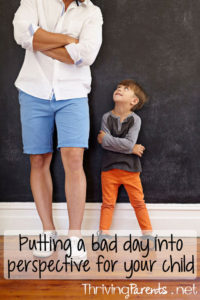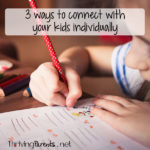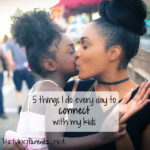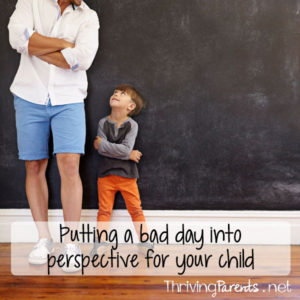
This is the worst day ever.
I uttered those words a million times when the girls were little so it shouldn’t have surprised me the first time that one of our kids went extreme in this same way. Something happened, I’m not sure what, and all of a sudden she said, “This is the worst day EVER!”
I was shocked. I literally took a step back because I wasn’t expecting such a negative, encompassing comment from my cute, little person.
Her tears began to flow. She felt what had happened was the end of the world. And let’s be honest, it doesn’t take much for a child to think the end of the world is coming, right?
I knelt down beside her and took her in my arms and let her cry for a few minutes. I was empathetic. I was comforting. I was present. I allowed her to be angry.
Then I said, “Do you really think this whole day has been bad? I think we’ve done some fun things today. Can you help me think of what our day was like?”
She looked at me like I was crazy. She was unable to see the good through the lens of the bad. I needed to prompt her with the beginning of our day but soon she was distracted from what upset her and focusing on making a list of all the things we had done that day.
She’d gone to Sunday School at church and was able to be in the same class as her sisters.
We went to the park before coming home to eat lunch.
She practiced riding her Stryder bike in the house.
She helped me prep a snack for the family and learned to use a knife.
I made her favorite dinner, which at the time was Burrito Bowls.
As she heard all the events that made up our day, she realized the day had been full of fun. I went on to explain the day wasn’t bad.
What she was experiencing was a BAD MOMENT.
“Oh sweetie, our day was filled with so many amazing things! This wasn’t the worst day ever. This was a bad moment. You’ll have them again but this doesn’t make the whole day a bad one.”
Sometimes something bad or disappointing happens and because it wasn’t expected, it feels like it’s the end of the world. Or the worst day ever.
It’s so easy to allow something bad or disappointing to ruin our mood and feel like it’s affecting our entire day. Sometimes the dream of what something will be like is nothing at all like the reality and that disappointment is hard to handle.
It’s so important we teach our kids that there truly are no bad days. There are days with bad moments in them. Some day there are a lot of bad moments. Those days stink (and this isn’t meant to diminish them). But it’s important to teach them (and maybe even ourselves?) to focus on the good. To see the positive when it’s the negatives that are glaring in our face.
A few weeks later I overheard someone crying in the play room. As I started to head in I heard that same girl saying to her sister, “This isn’t a whole bad day. There have been lots of good things. This is just a bad moment. I bet you’ll have another good moment before bedtime.”
Sometimes it’s easy to forget that our children are always watching. They imitate and reflect what they see us do, not what we ask or tell them to do. Feelings are hard for them to process on their own so it’s crucial that we reflect on our own feelings out loud so they can learn how to process their own too. Here are some books that may help.
This post contains affiliate links.
Toddler & Preschoolers
Elementary
Older Elementary
How often do you reflect on your own feelings and the way that you express them?
xoxo
–k
Teaching Kids How to Recharge and Practice Self Care
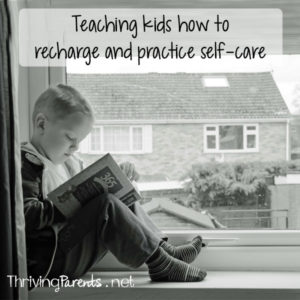
Teaching kids about self-care is sometimes easier than it is for us adults to practice it. Learn how to talk to them about the importance of it and then begin modeling it yourself!
What Happens When Mama Breaks?
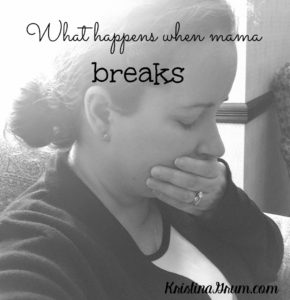
Mamas break. They fall apart and lose it. And that’s okay. Because we all know what happens when mama breaks…
Pin this to save it for later!
